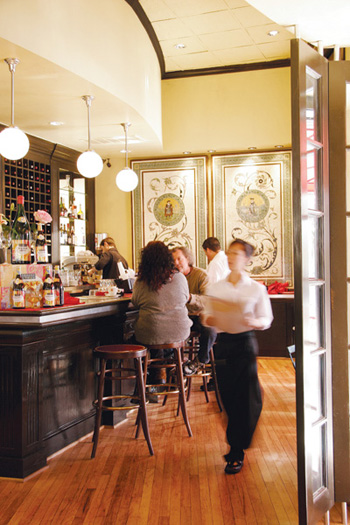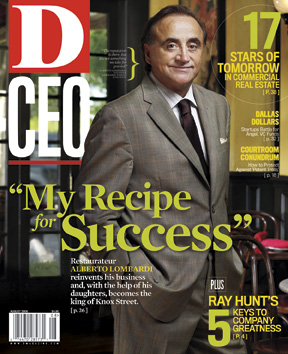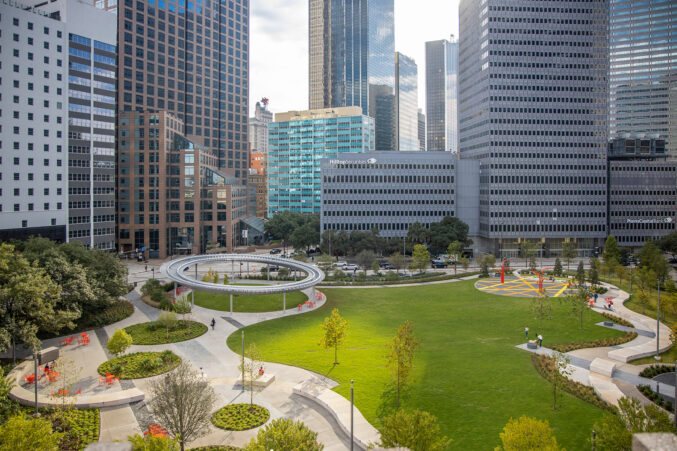But it’s funny to hear him recount his first night in Dallas. It was October, Lombardi recalls, and he was staying in a hotel near the West End. At one point, he walked downstairs to get some water, only to witness an all-out fistfight—“people really going after each other.” He says he bolted to tell his girlfriend that they needed to leave this terrible place. Then his sly smile comes out again—“I find out it was Texas/OU weekend.”
Shrugging his shoulders at a college football fistfight? Maybe this here’s a Texan after all. But after rattling off his travelogue, Lombardi adds with a smile that Dallas was never his dream destination. “Funny things happen,” he says, again securing that eye contact. “You like the business. You like the people. You have a wife. You have kids. The things of the adventurous spirit, even if it’s there, you have to think about more for the future than anything else.”
Nonetheless, he calls Dallas the “perfect spot” to settle down and create a home base. He called on friends and family to help finance his first eatery here, remodeling an existing restaurant space for about $15,000. But even though he opened nine additional restaurants in and around Dallas in his first decade or so here—10 if you count Le Rendezvous, which replaced the original Lombardi’s after it burned down—Lombardi was unable to drop anchor for some time. He spent some of 1985 living in Italy, thinking he was meant to eventually return to his native country, before deciding that “Italy had changed and I had changed.”
Four years later, the Rouse Co. approached him with an offer to expand his restaurants to shopping centers and convention-center locations. The plan made sense at the time; why compete against yourself in North Texas when you can reach new customers elsewhere instead? With the success of Lombardi’s Atlanta came similar ventures in Phoenix, Orlando, and Miami, along with two spots years later in Las Vegas. For a time, the expansion was positive. Not only did it extend the Lombardi brand and apply it to many viable downtown locations—his authentic brand of modern Italian cuisine was a lucrative foil to the ’90s flood of boomer-friendly chains—but the moves also revitalized an Alberto Lombardi who wasn’t ready to settle down yet.
But the sway to stray was unsustainable. “It got to a point where traveling and trying to maintain restaurants that were so far from where he is, was too much,” Alberto’s daughter, and Lombardi Family Concepts managing partner, Anna Lombardi Daigle, says. “He’s a hands-on person, and you have to be in the air all of the time if you want to be that hands-on.” Lombardi agrees that his favorite role in the job—providing “personalized service”—suffered as a result. And, even though he later sold the out-of-town eateries, his hometown restaurants by then were bordering on irrelevance in a competitive North Texas foodie landscape.
Lombardi is careful to point out his “firsts” in Dallas: the first foccacia bread; the first wood-burning pizza oven in town (he complains to this day that the Dallas City Council gave him the runaround on getting a permit to use it); the first authentic Italian dining experience. “The perception when I came to Dallas of Italian food was checkerboard floors, a bottle of Chianti on the table, spaghetti, meatballs, served with a piece of garlic toast,” he says.

But revelations in the restaurant business come in the form of a wallop, not a gradual decline, and Lombardi’s approach—which had focused a good deal on convention and tourism business—ran into a brick wall in 2001. “9/11 really woke us up,” he says. “As the travel industry went down, overnight, our business went down 30 percent to 40 percent. Like this,” and he snaps his fingers.
The impact of the drop was immediate. “The era of restaurants as theme parks is over,” he remembers saying then. Comfort and cocooning were on the rise; how could Lombardi’s posh concepts adapt?
Daughter Anna, who was living in New York City at the time, recognized the same issues, many of which compelled her to move back to be closer to her Dallas family. There was a trend that was successful near her Brooklyn home: neighborhood restaurants. Lots of small, locally owned hot spots fostered dedicated fan bases and enjoyed each other’s spillover.
Her father “came up with this idea that, OK, what are the shifts?” Anna says. “What’s changed in the minds of our customers? I go back to this, but there was a huge shift after 9/11, and family became one of the most important things to people, along with tightening their wallets. Where can a family of five go and get a dinner for $60 instead of $150? He took that idea of the neighborhood restaurant and said, ‘This would work right now in this time.’ He saw what a success that was, and he realized sometimes bigger isn’t better.”






